Issue 92 : 17 October 2021
Talofa Lava, Kia Orana, Malo E Leilei, Tena Koutou, Hello ...
... and welcome to the latest issue of “For The Love Of The Game”, the official e-zine of the New Zealand Amateur Sport Association Inc., founded in 2017.
If you have any feedback on this issue, ideas for future articles, or would like to contact the Editor, please click here. And, you are invited to forward the e-zine to others you know, who may be interested in reading it. An archive of earlier editions of the e-zine can be found here. For those who follow Twitter, you can also follow the Association, @AmateurSportNZ.
If you are interested in applying for membership of the Association, please click here.
Political Parties “Keep Mum” On Incorporated Societies Bill ...
Other than responses received from the ACT Party and Labour Party (referred to below), there has been no reply to the Association’s request of all parliamentary political parties to confirm if they have considered: a. the specific impact of the Bill (as drafted) on the sport and recreation sector; b. whether or not the recommendations made by the Association in its submission to the Economic Development, Science and Innovation Select Committee may assist sport clubs in meeting their obligations under the Bill; and c. if the Bill is (in their opinion) likely to support and sustain incorporated sport clubs as the primary delivery method for sport in local communities.

On Friday, the Association met with Damien Smith, sport and recreation spokesperson for the ACT Party, who in principle agreed with the Association’s view that the new legislation should aim to ameliorate rather than increase the regulatory burden on community sport organisations. The ACT Party caucus will discuss the Bill in further detail before it is returned to Parliament. The sport and recreation spokesperson for the Labour Party (the current Minister, Grant Robertson) declined to comment, given his ministerial role.

Due to COVID-19 and other priorities, Sport New Zealand has communicated to the Association that it has not been able to consider the finer details of the Bill and how they might impact community sport organisations. The Association is therefore pleased to be able to assist community sport organisations in raising their awareness and understanding of the impact of the Bill (if passed into law) on their operations.
Ottawa Makes COVID Vaccinations Mandatory For Indoor Sports ...
Coaches, volunteers and officials (aged 12 years and older) must now be fully vaccinated to participate in indoor organised sports in Ottawa, Canada. Coaches, officials and volunteers directly supporting an organised team sport who enter facilities in the city of Ottawa used for team sport and recreational fitness activities, must now show proof of vaccination, or provide proof of a medical exemption.
An educational approach will be taken to enforcing the rules before enforcement begins later this month. individuals who do not comply with the above noted requirements may be liable for a fine up to a maximum of C$100,000 and for a term of imprisonment of not more than one year. The proof of vaccination for indoor organised sports does not apply to individuals aged 12 to 17 who are "actively participating" in organised sports indoors.

Given the New Zealand Government’s proposal to introduce a digital COVID-19 vaccination certificate containing a QR code, for use in “high-risk settings”, it is important for community sport providers to consider how their operations may be affected should a similar requirement apply to indoor sport facilities in this country. You can read the Order from the office of the Chief Medical Officer of Health of Ottawa Public Health, by clicking here.
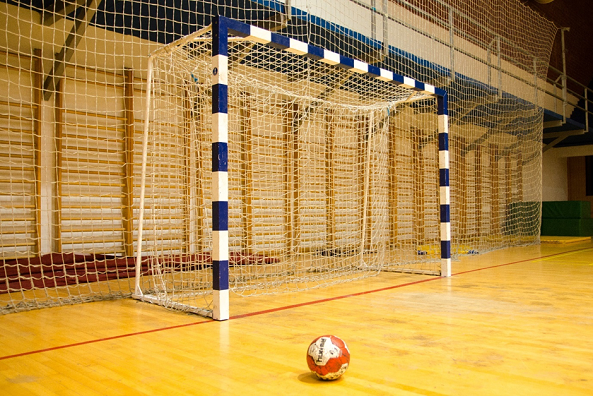
(Sport entities will need to think through the operational implications of vaccination certificates)
Select Committee Report Deferred ...
On Tuesday 7 September, Parliament’s Business Committee acceded to a request from the Economic Development, Science and Innovation Select Committee to defer the Select Committee’s report on the Incorporated Societies Bill from 6 October 2021, to 3 November 2021. (This decision is recorded as “SO 303(2)”).
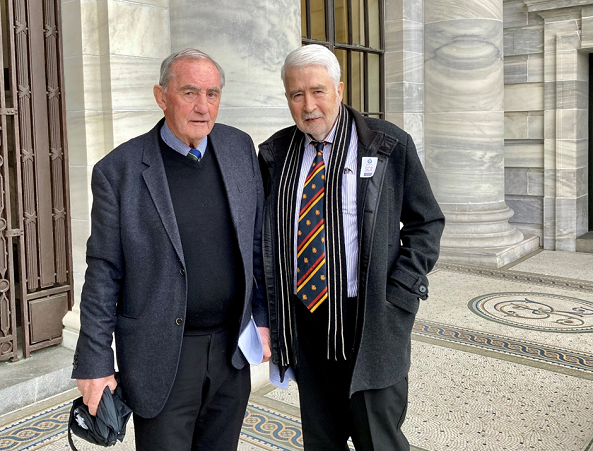
(Patron, Andy Leslie and Vice-President, John Morrison presented to the Select Committee)
The Clerk of the Select Committee, on enquiry from the Association as to the reason(s) for the deferment wrote, “select committee proceedings are confidential until the committee reports an item of business (in this case, a Bill) back to the House.” The Clerk was therefore unable to provide any reasoning behind the Select Committee’s decision to request an extension.
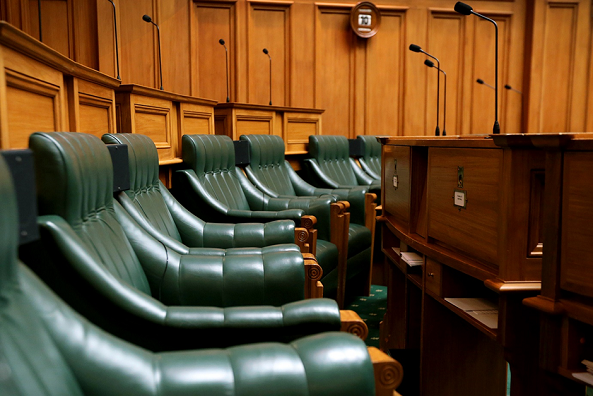
(The Bill's Second Reading has been deferred until Wednesday, 3 November)
Noting the large number of submissions made on the Bill, the Association hopes that the deferment indicates that the Economic Development, Science and Innovation Select Committee is giving full consideration to the specific recommendations made by the Association in its written and oral submissions, (and those made by other submitters).
National Sport Club Survey : Prezzy-Card Winners ...
Congratulations to the following sport clubs who have each won a $100 “Prezzy-Card” as a result of completing the 2021 National Sport Club Survey: the Christchurch Singletrack Club Inc. (BMX), the Kawhia Golf Club Inc., the Phoenix Darts Association Inc., the Tutukaka Coast Youth Sailing Club Inc. and the Waverley Bowling Club Inc.
We hope that our small contribution to each club, in recognition of their support of the Association’s ongoing research and "thought leadership", helps to make a difference.

Viewpoint : More Focus On The “Common”, Than The “Wealth” ...
The decision by the Commonwealth Games Federation to enable host nations to propose sports “relevant to their nation or culture, to enhance cultural showcasing and community engagement” is a huge boost for the role of amateur sport in building strong communities.
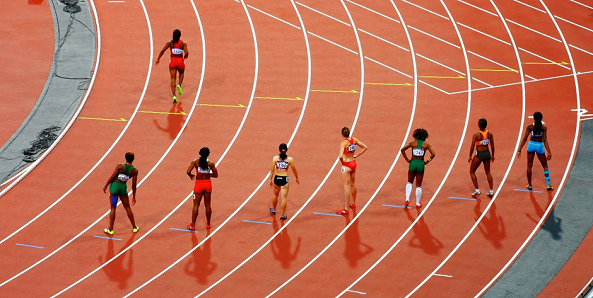
In recent years, the Commonwealth Games has competed for international media attention and sponsorship against the heavily commercialised Olympic Games, at the risk of being consigned to ever diminishing status and relevance as a global sporting event.
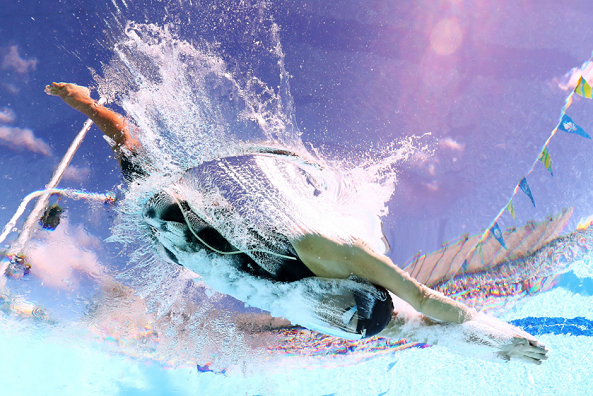
(Only athletics and swimming will be compulsory sports under the new guidelines)
Under the revised rules, only athletics and swimming will be compulsory sports, due to their historical place on the programme since 1930 and based on universality, participation, broadcasting, spectator interest, para-athlete inclusion and gender balance. In the future, approximately 15 sports will feature at each Commonwealth Games, with host countries to be provided with the flexibility to choose from a wider list of core sports and propose entirely new sports relevant to their nation or culture.

(Building "peaceful", "sustainable" and "prosperous" communities through sport)
Of course, this is perceived as threat to certain parts of the elite sport establishment, where the Commonwealth Games have long been seen as a launch pad for individual career progression and as a stepping-stone in preparation for the higher profile Olympics. What the change will bring is a higher degree of community engagement and opportunity for athlete recognition than the current format allows, which is superb for nation-building and for “the love of the game”. The vision of the Commonwealth Sports Movement is to build peaceful, sustainable and prosperous communities across the Commonwealth through sport. Long may it continue!
(You can download and read the Federation's full recommendations, here).
National Sport Club Survey (NSCS) Workshops Postponed ...
Current COVID-19 restrictions in the northern region of New Zealand have unfortunately limited the availability of the Auckland-based AUT members of the NSCS Project Team to participate in the annual series of NSCS workshops, initially planned for November. However, the Project Team is now considering a range of innovative ways to deliver insights from the 2021 survey either in-person, or through the use of technology.

Meanwhile, the Project Team is busy and focused in analysing the survey data. Further details concerning the dissemination of these insights will be provided in this e-zine and on the Association’s web-site (www.asa.org.nz), in the near future.

From The Archives ...
NEPIA’S LONG TRIP
STAR (CHRISTCHURCH), ISSUE 19103, 23 JUNE 1930, PAGE 14
“About two thousand miles of travelling has been done by George Nepia, the New Zealand full-back, for three rugby matches in the seven days prior to the test match at Dunedin on Saturday.
Nepia left his home at Rangitukia for the final [All Blacks] trial match at Wellington last Wednesday week - a distance of about five hundred miles. On the following morning he left for Napier, and that evening boarded a car for Gisborne, which he reached at 1.30am on the Friday. He left at eight o’clock the same morning for Rangitukia, which he reached at 2.00pm. A trip of eighty miles to Tolaga Bay was undertaken the same evening.
On Saturday afternoon Nepia played for the Tikitiki Sub-Union against Tolaga Bay. On the return journey to Rangitukia the same evening he had to cross a flooded river in the rain, getting home at 6.00am on Sunday. Later in the day he set out for Wellington. He reached Napier at 9.00pm and went on to Wellington the next morning, boarding the ferry steamer that night for Lyttleton. He arrived at Oamaru with the rest of the New Zealand team shortly after noon on Tuesday and played against North Otago last Wednesday.”
George Nepia’s “love of the game” surpasses anything that could be suggested by way of comparison in the professional era, as evidenced by the above travelogue. While George Nepia was originally from Nuhaka (near Wairoa) and played his early rugby for Hawkes Bay, following his marriage to Huinga Kohere of Rangitukia on 6 May 1926, his rugby loyalty moved permanently to the East Coast region, where he first donned the blue and white jersey of the Rangers Rugby Football Club, also becoming the sole selector for the Waiapu Sub-Union.
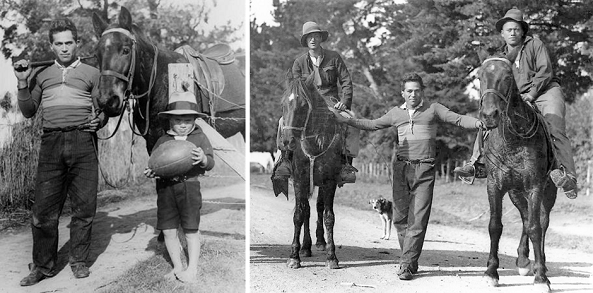
(George Nepia in 1935, with his eldest son George (left) in Rangitukia)
While 1930 was the final year in which Nepia represented New Zealand (following his debut in 1924-1925 for “the All Black Invincilbles”), 17 years later in 1947 (as a 42-year-old), he was still playing club rugby for his local team and was reported to have played “a grand game at second five-eighths”, defending the Duff Cup against the City club from neighbouring Ruatoria. In 1950, Nepia captained the Olympian rugby fifteen against the Poverty Bay representative side (captained by his eldest son George), with the Olympians winning the match by 17 points to 11.
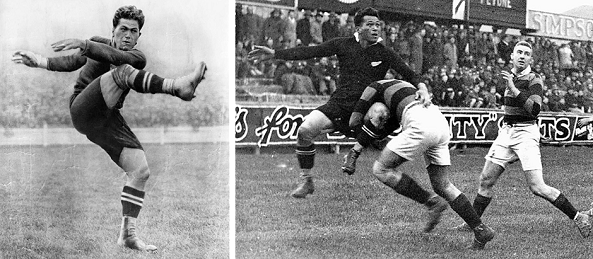
(George Nepia was perhaps New Zealand's finest full-back of all time)
Following his playing days, George Nepia became a rugby referee (to a Provincial Union representative level) and for many years took a keen interest in coaching the rugby rangatahi of the Waiapu Sub-Union. George Nepia Memorial Park (also known as “Papatakaro Rangitukia” and "Windy Park"), continues to be the home ground of the Waiapu Rugby Sub-Union and symbolises the essence of what is often referred to as “grassroots rugby” in this country.
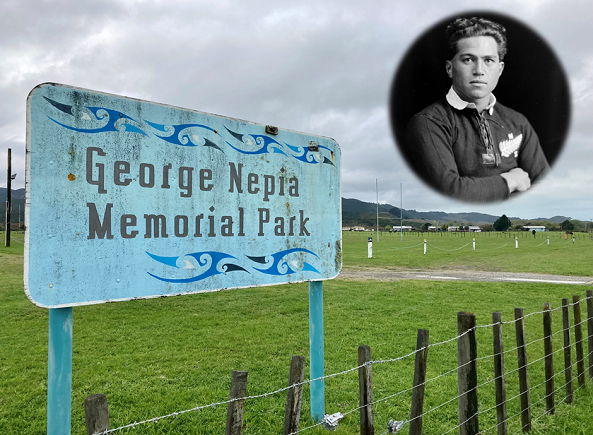
(George Nepia Memorial Park in Rangitukia, near East Cape)
The Final Word ...
“If you're going to spend your whole life in the grandstand just watching what goes on, in my opinion you're wasting your life.”
(Jackie Robinson – 1919-1972)